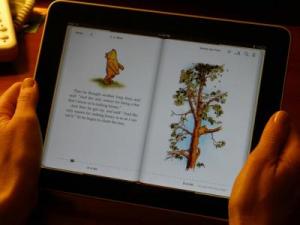By Susan Young
It’s all about the audience.
This morning’s panel “Your next book will be a pixel: Navigating e-books and e-rights” emphasized the importance of engaging with your readers both before and after the publication process.
The real change in the digital revolution of book publishing, said Guy Gonzales, director of Programming and Business Development, Digital Book World, is the ability to interact with your audience.
It’s an incredible time for an author to get your work out there and build an audience, he said.
People have been talking about e-book revolution for so long that people can be pessimistic about its potential, said Brandon Badger, product manager for Google Books. “This is the moment.” Prices are dropping on e-readers, people are adopting smart phones in droves, and e-book revenues are nearly doubling every year.
Non-fiction enhanced e-books, those with integrated audio or video, or extras like interviews, are a very vibrant area, and non-traditional publishers are looking for that kind of content, said Gonzales. The potential for interactive visualization of data, especially with books on science, is the real opportunity of the growth of digital books, said Badger.Digital books and their related content can ease the way authors interact with their audience. Take the example of Stephen Elliott’s book, the Adderall Diaries. Elliot developed an application for smart phones that features a chat room where readers can interact with the author and each other, said Gonzales.
It’s becoming more important for authors to manage their own communities, said Jason Allen Ashlock, founder and principal of Moveable Type Literacy Group. “Find out who your audience is and find out how they will discover you,” said Jason. Content may be king, but discoverability may be even more important, he said. He also pointed out that if authors can find out who their audience is early on, then they can speak more clearly to them.
One audience member attempting to make the transition into new, more interactive technologies asked if she needed to learn programming. Ashloft says no, writers just need the right partners. He advises looking for the agents and publishers educated enough to know what’s possible for your digital publication.
But education doesn’t hurt — as a writer, the more educated you are about interactive technologies, the better you will be at finding partners who can help you. Debbie Stier, formerly senior vice president, associate publisher, and director of Digital Publishing, HarperCollins, said that getting a device is worth the investment. “Be as informed as possible about trends that are happening,” she said.” “We all need to be thinking about [smart] phones as sensory devices."

